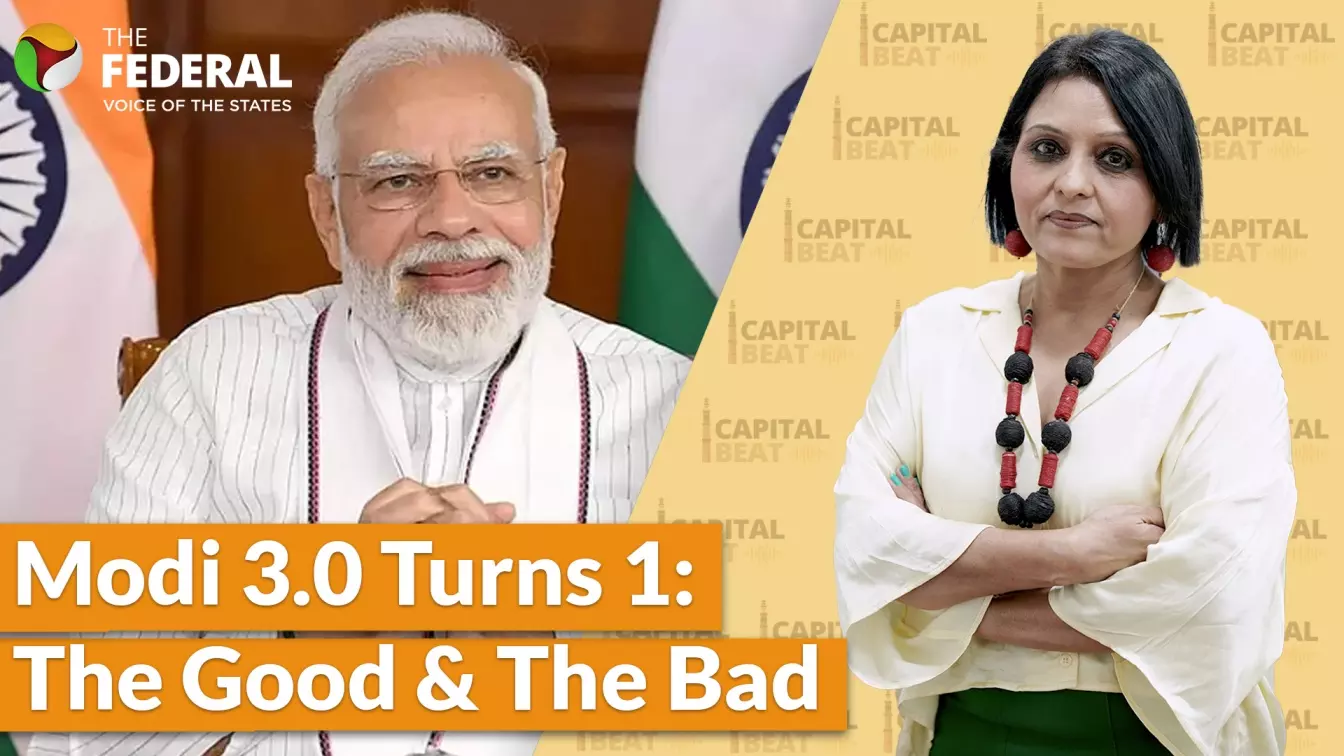
Capital Beat: Modi govt completes 11 years: Political dominance, economic paradoxes
Experts discuss Modi's evolving power, RSS tensions, economic inequality, and the diminishing roles of opposition and media

In this episode of Capital Beat, political commentator and author Nilanjan Mukhopadhyay and S Srinivasan, Editor-in-Chief of The Federal, dissect the Narendra Modi-led NDA government’s journey as it marks the completion of 11 years in power, including its first anniversary in the third consecutive term.
Moderated by Neelu Vyas, the discussion spans Modi’s evolving political dominance, institutional dynamics within the BJP and the Sangh Parivar, economic contradictions, and the fading space for opposition politics and media independence.
Political evolution
Panelists acknowledged that Prime Minister Modi’s longevity at the helm —11 years and counting—is politically significant. “It’s a triumph,” noted Mukhopadhyay. “Modi has faced no real internal challenge, and the opposition has been consistently weak.” However, both panelists argued that while the BJP boasts of development achievements, public services often reveal a different reality.
From the collapse of infrastructure like Delhi’s Pragati Maidan tunnel to concerns over widening economic inequality, Mukhopadhyay pointed out that Modi’s model comes with growing disparity.
“The rich are getting richer, while 800 million Indians need free food grains. That’s a policy failure, not a success,” he stated.
Sangh Parivar strain
Mukhopadhyay underscored intra-family tensions between the BJP and its ideological parent, the RSS. He argued that the RSS’s visible disengagement in the 2024 elections was a clear message to Modi. This followed BJP President JP Nadda’s now-infamous statement claiming the party no longer needed the RSS’s support.
Mukhopadhyay emphasised that RSS chief Mohan Bhagwat’s cryptic criticisms were “understood by everyone” to be directed at Modi’s personality cult. “The RSS never liked the complete personalisation of power,” he said, referencing slogans like “Modi ki guarantee.”
The BJP’s eventual outreach to the RSS post-elections, including Modi’s symbolic visit to Nagpur during Gudi Padwa, was seen as a thaw in tensions.
Coalition management, Oppn weakness
Srinivasan credited Modi with managing the new coalition dynamics post-2024, citing the “smooth continuation” of governance despite the BJP falling short of a majority. “The way he brought in Chandrababu Naidu and Nitish Kumar shows his tactical strength,” Srinivasan said, adding that “even without major sops, partners have fallen in line.”
However, both panelists noted that the Opposition remains ineffective. Despite Congress winning nearly 100 seats and Rahul Gandhi being named Leader of Opposition, Srinivasan argued, “Parliamentary committees were formed, but decisions moved ahead as if there was no Opposition.”
New face of nationalism
Srinivasan analysed how majoritarianism and a transformed idea of nationalism are now deeply embedded. “Nationalism today excludes rather than includes,” he observed, pointing to the BJP’s sustained narrative of “appeasement politics” and frequent references to Pakistan, especially during national crises.
Nilanjan added that issues like Operation Sindoor revealed how the government controls narratives. “We still don’t know who attacked. There’s been no transparency,” he noted. “The opposition’s failure to demand answers is a big concern.”
Economic paradoxes
Srinivasan was critical of the government’s economic claims. He noted that while welfare schemes like free food have helped “keep the masses afloat,” long-term indicators don’t match the rhetoric. “Foreign investments are falling. Indian companies are investing abroad,” he said, citing recent data from The Federal. “Corporate tax cuts have not boosted capital expenditure.”
Interestingly, both panelists pointed out that agricultural growth, despite climate challenges, has outperformed expectations, becoming a surprising stabiliser. But both the panellists agreed that rising prices and stagnant middle-class growth remain key concerns.
Media’s fading role
One of the most sobering segments was on the media’s deteriorating role in holding power accountable. Srinivasan was blunt: “The media has surrendered. Even if a press conference is held, no tough questions will be asked.” He contrasted this with the noisy, chaotic—but effective—press environment pre-2014.
Vyas, the host, emotionally recalled her earlier days as a field reporter. “We were once told—just shove the mic into the minister’s mouth and get a byte. That spirit is gone,” she said.
Diminishing federalism
Srinivasan lamented the erosion of federal space, noting that even BJP-ruled states don’t raise local issues like they used to. “Where are the debates on equitable finance commission terms, governors’ roles, or education policy?” he asked. “Once noisy, dynamic federalism has gone silent.”
He also pointed to the “vanishing act” of controversial governors once state leadership shifted, noting how Delhi’s Lieutenant Governor faded from headlines after AAP’s position weakened.
Comfort or crisis?
In closing, Mukhopadhyay said Modi may seem politically comfortable, but “he’s skating on thin ice.” Real issues—economic, foreign policy, governance—are bubbling under. “Things look fine until they don’t. And when cracks emerge, it could be sudden,” he warned.
Srinivasan agreed. “Political change, when it happens, is rapid. The coming months will reveal whether the prime minister's hold remains intact—or faces real tests.”
The content above has been generated using a fine-tuned AI model. To ensure accuracy, quality, and editorial integrity, we employ a Human-In-The-Loop (HITL) process. While AI assists in creating the initial draft, our experienced editorial team carefully reviews, edits, and refines the content before publication. At The Federal, we combine the efficiency of AI with the expertise of human editors to deliver reliable and insightful journalism.

